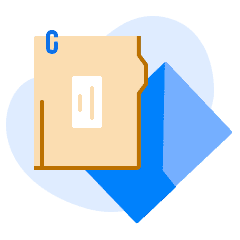While collecting and filling out your documents as you prepare to study abroad in Canada, it’s important to prioritize writing your statement of purpose (or SOP). An SOP is a personal essay that helps you stand out from other students with similar accomplishments.
Not sure where to begin? Keep reading for a breakdown of how to write your SOP!
Wondering why an SOP is so important? Read our in-depth blog for a broader look at SOPs.

What Should I Include in My Statement of Purpose?
An ideal statement of purpose uses a student’s unique experiences to introduce them and explains why they’ll be a positive addition to the program they’re applying to. Some questions to answer in your SOP can include:
- Who are you, and why are you a good candidate for this program?
- Why do you want to apply for this specific program?
- Where do you want your degree to take you?
- How will your past experiences, including your educational background, help you to succeed?
- Why are you choosing this specific institution?
This is your time to shine! When answering these questions, don’t be afraid to talk about all you’ve accomplished and learned in your life. Avoid overused clichés, or copying someone else’s SOP. The admissions team will check for plagiarism, and you’ll risk having your Canadian student visa rejected if they believe you copied someone else’s SOP.

Tips for Writing a Statement of Purpose for Canada
Before starting to write your statement of purpose, here are a few tips you should consider:
- Keep things original. Never, under any circumstances, copy or purchase someone else’s work.
- Be clear about returning home. Avoid discussing any plans you may have to stay in Canada upon completing your program. This can be misconstrued and goes against student visa rules and regulations.
- Elaborate on your experiences. Go into detail about extracurricular activities, personal or educational accomplishments, and challenges you’ve overcome.
An example of an introduction to an SOP can look like this:
“My name is ___, and I’m applying to the Computer Science program at ___ University. I know I’ll be a great candidate for this program because of ___ and ___. I want to study in Canada, and specifically at ___ University, because of ___ and ___. After graduating with my degree, I plan to use my experiences to ___ and advance my career back home.”
This is an example only, and not a template. Your own SOP should be unique, much more detailed, and specific to your experience.
Learn how to prevent plagiarism in your SOP by reading our blog.
Steps for Writing a Statement of Purpose

1. Start with an Outline
Begin by asking yourself the following questions:
- “Why do I want to study in Canada?”
- “Why do I want to study in my program and institution of choice?”
- “What experiences or prerequisites do I have that will help me when studying this program in Canada?”
- “What will I have gained when I return home after studying in Canada?”
Make a list of all the answers you come up with. Think about if there was anything academic or personal in your life that contributed to your reasons. Some common reasons include
- Past and current academic experiences
- Past or current personal experiences
- Work and volunteer experience
Tip: When providing your personal or academic information, be as accurate as possible. This includes addressing any gaps in your education.

2. Drafting Time
Now that you’ve come up with an outline, it’s time to start drafting all the information you’ve gathered! Start with a structure that includes:
- An introductory paragraph. Your introduction will tell the institution who you are, and what your background is.
- Body paragraphs. Each body paragraph should elaborate on one main point. Also, be sure to list your experiences in chronological order.
- Conclusion. This is where you’ll briefly summarize all the information presented in your SOP. It’s also an excellent opportunity to thank the person reading your application!
While creating a structure, keep the majority of your word count in your body paragraphs. Most SOPs are between 800–2,500 words. Check with your institution to confirm their preferred SOP word count.
Tip: Try to write your SOP at a level that is equivalent to your English test scores.

3. Add Your Proof
Once you’ve finished drafting your SOP, return to the experiences you’ve listed in it, and ensure you include supporting documentation. It’s especially important that your academic history is accurate and lines up with your reasons for applying.
Supporting documentation can include:
- Proof of Financial Support. These show proof of how you’ll be able to support yourself financially as a student living in Canada.
- Resume. This provides more information about your professional experiences and skills.
- Awards and certificates. These provide proof of any awards noted in your SOP.
- Medical or employment records. These records can help back up your given reasons for any study gaps.

4. Edit, Edit, Edit!
After brainstorming, drafting, and adding supporting documentation to your SOP, give yourself a well-deserved pat on the back. You’re all done!
Well—almost. While the majority of the work is done, it’s also extremely important to edit your SOP. Some tips to keep in mind:
- Make sure your information is accurate, is in chronological order, and has supporting documentation where needed.
- Read it aloud to confirm your writing flows well and makes sense.
- Check that your grammar and spelling are correct.
- Ask a friend or family member to give you their feedback.
Editing your work may feel redundant, but it’s a key step! Overlooked mistakes can be misinterpreted, or might make your SOP less impressive. Put your best foot forward by spending the time to edit your SOP.
Now that we’ve broken the process down, taking the SOP writing process step-by-step should help make it a little easier. Follow the guide we’ve highlighted in this blog, and you’ll be sure to write an amazing statement of purpose for Canada. Good luck!
Ready to start your study abroad journey? Reach out to us today—ApplyBoard’s team is here to help!



